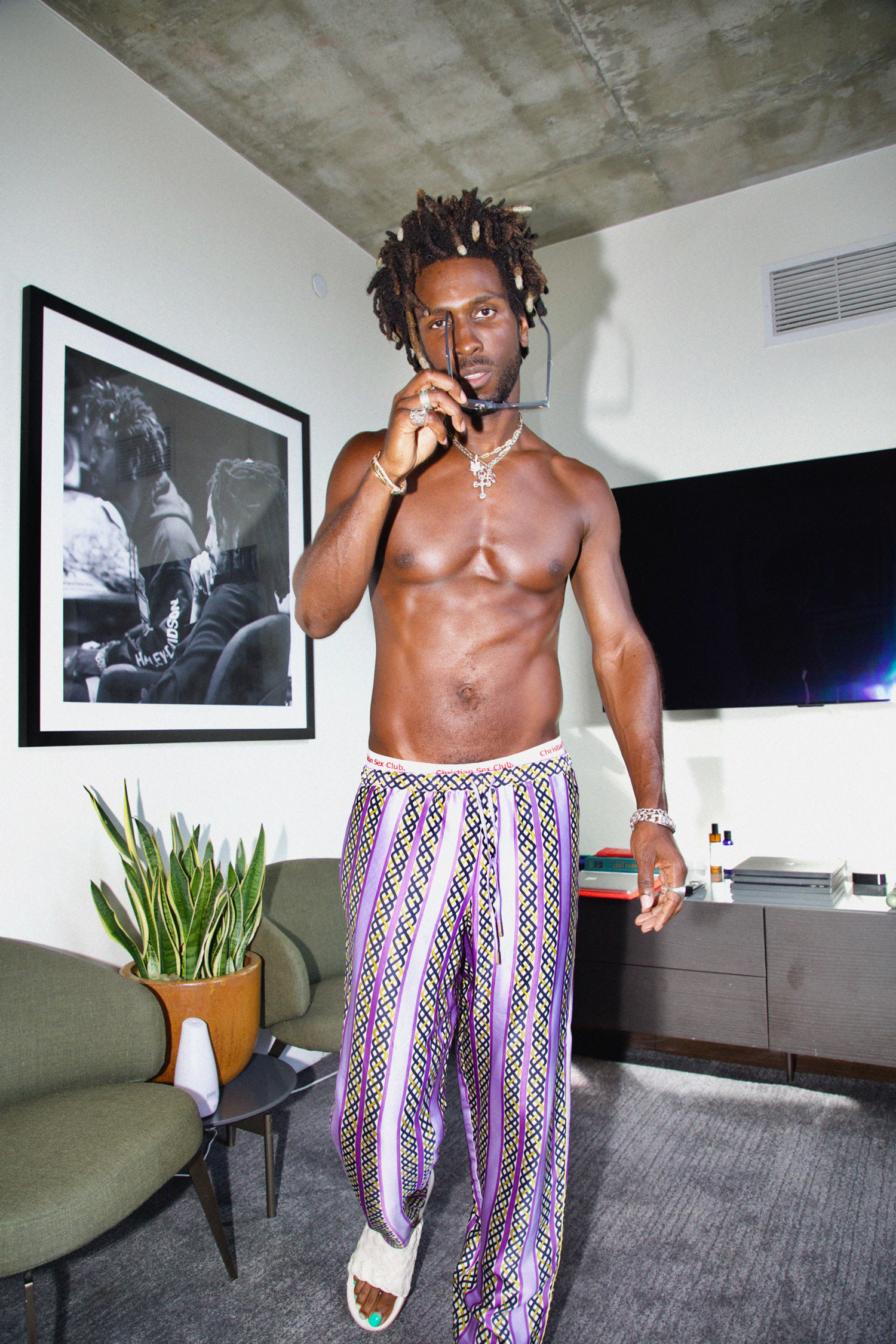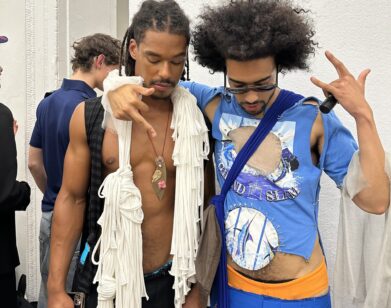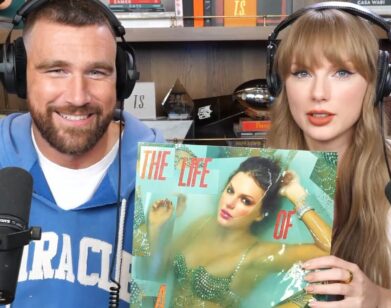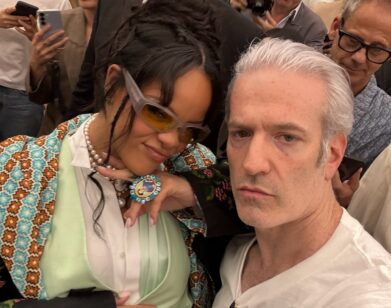in conversation
SAINt JHN and Lenny Kravitz Discuss Making Music in a New World
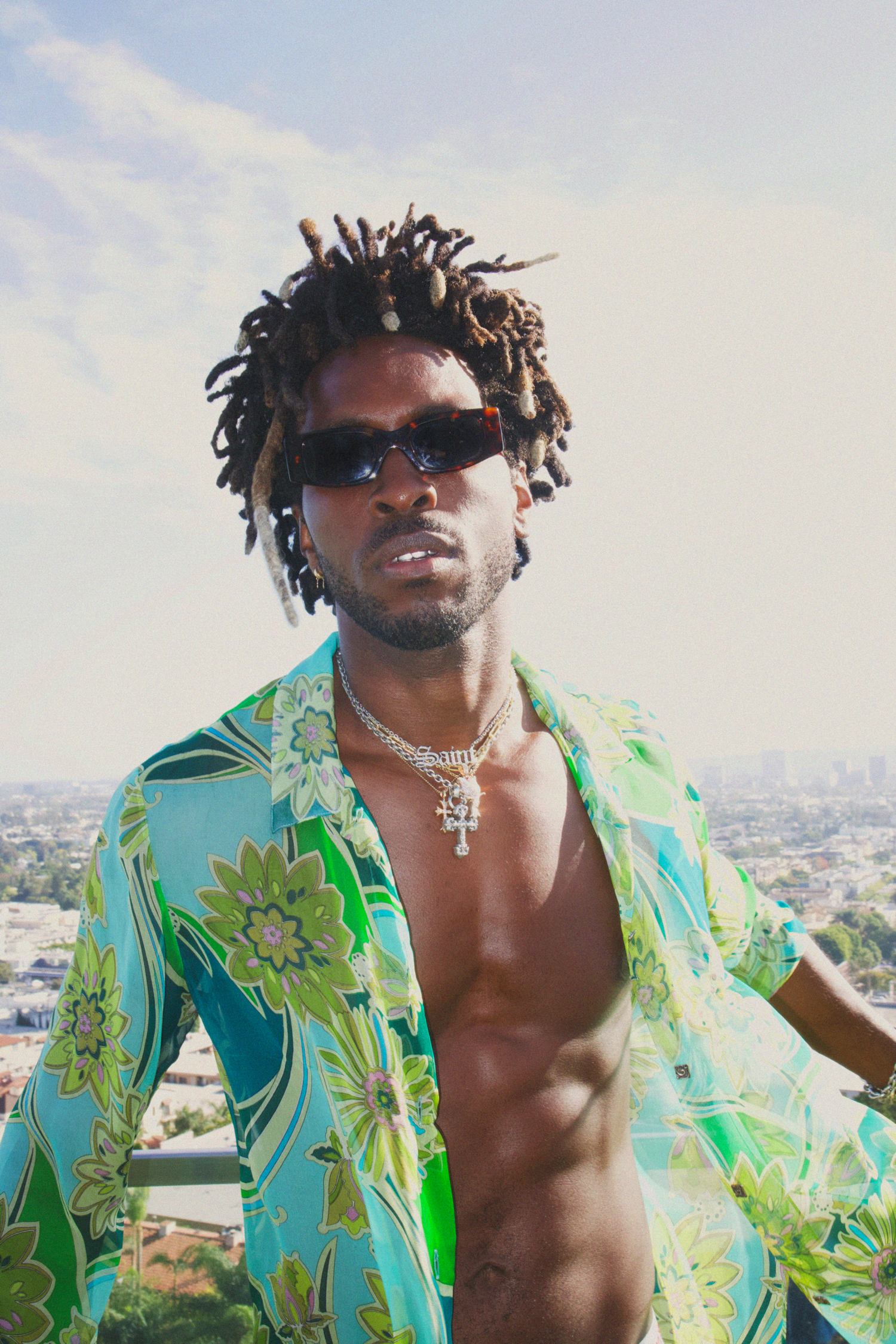
SAINt JHN has confidence. The kind of confidence to refer to his albums as collections. The kind of confidence to wear women’s blouses in the historically alpha world of rap. And the kind of confidence to feature some of the biggest names in music on his new record while managing to make it unmistakably his own. For the rapper born Carlos St. John Phillips, While the World Was Burning marks the culmination of a journey through the music-industry gauntlet that included songwriting for superstars, a chance encounter with a retired record label executive, and, most improbably, the work of an obscure 19-year-old producer from Kazakhstan. Early last year, Imanbek Zeikenov discovered “Roses,” a menacing track SAINt JHN released in 2016, when he was still an undiscovered rapper trying to forge a path. After speeding up the vocals to an helium-inflected pitch and remixing the track into a more dance-friendly number, the song exploded, buoyed mostly by its staggering popularity on TikTok. Suddenly, SAINt JHN, who split his youth between Georgetown, Guyana, and Brooklyn, New York, had the kind of ubiquitous hit that marketing executives fantasize about. And while “Roses (Imanbek Remix)” sounded nothing like the spectral, melodic trap that he perfected on his first two albums, Collection One and Ghetto Lenny’s Love Songs, SAINt JHN had the confidence to embrace it, releasing a version with J. Balvin that hit number one on the Billboard 100. Now, with the release of While the World Was Burning, the rapper has made an album that, as he tells his friend and collaborator Lenny Kravitz, has given him something else: freedom.
———
LENNY KRAVITZ: How have you been, man?
SAINt JHN: In a wild year, I’ve been good.
KRAVITZ: I know. Both of us were on the road.
SAINt JHN: And then everything hit pause. What was that like for you?
KRAVITZ: There’s pause, and then there’s this. Since I left Paris on March 4th, I’ve been here [in the Bahamas]. I haven’t left the island.
SAINt JHN: Is that the longest you’ve ever been there?
KRAVITZ: Yeah.
SAINt JHN: What’s that like?
KRAVITZ: It’s actually been amazing. Life has been one day at a time. I’m living in the moment, more than I ever have. I always strive for that, but it’s been a really great exercise in learning how to get better at it. But anyway, we’re here to talk about you. Last night I sat and listened to the album with my headphones on, and it was a trip. Let me start with this: We both have similar backgrounds, the whole Caribbean thing, and Brooklyn, New York. I know that you split your youth between Brooklyn and Guyana, and I wanted to know how those places influenced your music, and how those influences interact with one another?
SAINt JHN: Guyana made me hyper-aware of melodies. I didn’t know I was listening to melodies, because before you know the language, you just know the feeling. And I knew the distinction between hearing [the Beenie Man lyric], “How will you feel if you wake up one morning and saw a big M16 nozzle at your jaw,” and when I heard Jay say, “Thug ’til the end, tell a friend bitch. Won’t change for no paper plus I been rich.” There’s a different punctuation. I didn’t know what I was necessarily listening to, but I knew what was driving me. And now I could identify it. So when I was listening to music in Guyana, the melodies taught me about the world. They taught me what music was. And when I was listening to rap in America, it gave me an appreciation for the culture, because it was so brash and unbothered and unapologetic.
KRAVITZ: You can hear those two worlds together in your music, which gives you an extremely original sense of melody. That’s one thing I learned when we went into the studio that night in Paris. I clocked your sense of melody, and how original and interesting it is.
SAINt JHN: Thank you, bro.
KRAVITZ: You wrote your first song in your first year of high school. Where did that come from?
SAINt JHN: The trick was this: I used to steal my brother’s raps, and I’d go to elementary school, and I’d be rapping them, and the kids would be like, “Yo, you the greatest.” And I’d be like, “You know I am.” Then I started high school in America, and I was just a little too reckless. High school, for me, was the equivalent of when people go to college now. It was like Van Wilder meets SAINt JHN. I was there for four months, and then my mom tricked me and sent me back to Guyana, because I was doing too much. I couldn’t steal my brother’s raps when I went back. I didn’t have the proximity. So I wrote my first rap, and it was terrible. It was no type of good. But that was the start. I had to keep going, not for the purpose of vanity, but because I liked the expression.
KRAVITZ: Before you came out on your own as a solo artist, you started in the industry trying to write songs for other artists like Rihanna and Usher. What did that experience teach you about the music business, and about working with other artists?
SAINt JHN: When I was writing for other people, I learned how to sit still. Being an artist, you get to be brave, and you get to be bold, and I learned to define myself by how bold I could be. But when I was a writer, the first time they told me to sit down, sit still, listen, and say nothing. I learned to submit myself to someone else’s vision. It was incredibly humbling. It was like gladiator school for egomaniacs.
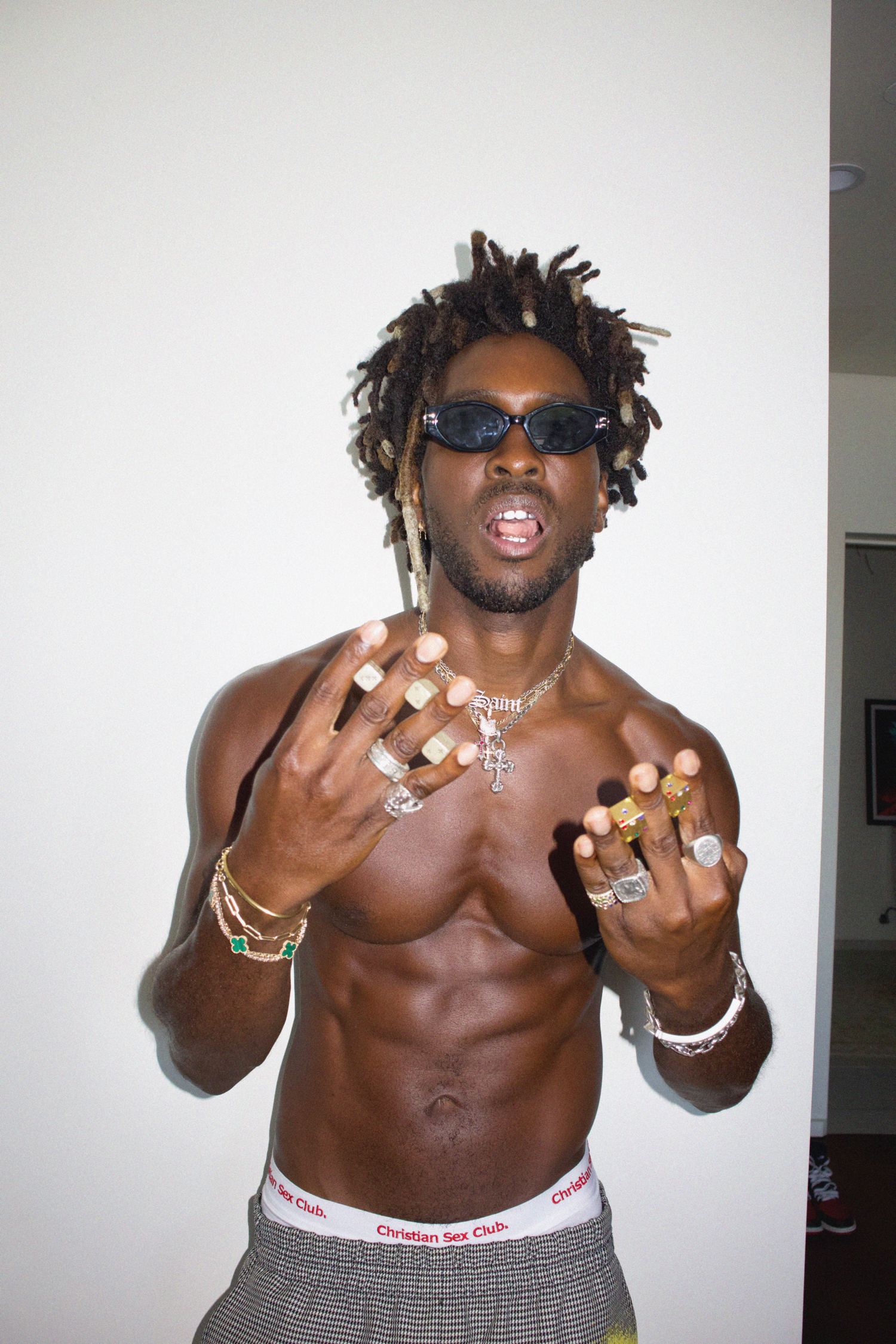
KRAVITZ: I remember when I was coming up, I was making demos for folks, trying to get a record deal. They’d bring me their songs, I’d put them together, and they’d leave with their demo. I was like a one-stop shop. And that was one of the first jobs I had, which, like you say, taught me so much.
SAINt JHN: It’s really grounding.
KRAVITZ: Your new album is entitled While the World Was Burning. What’s the meaning behind that title, and how does it represent the overall direction of the collection?
SAINt JHN: Well, it’s pretty simple. I had no intention of making a collection this year, because the world caught fire and I didn’t necessarily know what to do. When the world hit stop, and I got to rest my knees for the first time, sleep for more than five hours for the first time, and discover what green juices really were, I took that well. I took it as a real opportunity to catch up on myself.
KRAVITZ: I have to be honest. Even being in this beautiful paradise, in the middle of nowhere, it took time to come down, because I was still riding that wave of energy from being on tour for two years and doing everything that we do.
SAINt JHN: You grow so accustomed to an incredible amount of momentum that you think the only way to live is with that type of speed. When I got to hit pause, it forced me to consider what type of music I wanted to make. As the world was on fire, I was here doing this, thinking this, feeling this. For the first time in my life, I’ve felt a certain degree of freedom while the world was burning. I’ve felt myself self-actualize and become the gorgeous person I think I am, while the world was burning. I’ve watched people switch sides on me while the world was burning.
KRAVITZ: Is this the first time that you’ve put music out without going out to support it live right away?
SAINt JHN: The very first time.
KRAVITZ: How does that feel? I’m finishing an album right now, and it doesn’t matter that I can’t go out and support it in that way. I’m doing it because the music is in me, and I have no choice. If others enjoy it, that’s wonderful. But I’m putting it out because I have to put it out. That is what we do. We express ourselves through music.
SAINt JHN: No matter what happens, as long as I communicate what was honestly happening in my head and my heart, I can’t miss. Everybody’s in the same place. If I can’t tour and you can’t tour, then nobody can tour. There’s equilibrium, so now we’ve just got to listen to the music. There’s a freedom to that.
KRAVITZ: I agree with you. You refer to the album as a collection rather than, say, an album. Can you talk about the meaning behind that?
SAINt JHN: My life is a series of collected ideas, collected friendships, collected garments, pieces of art, broken memories, old wine glasses. Everything I do, when you think of how to contextualize it, you think of how to place it. When you look at it as a collection you can find a place for it in your life so that nothing is out of place. Even the turmoil.
KRAVITZ: Absolutely. Neither of us is about boxes or categories, but for folks, because I hear people talking about this, do you consider yourself to be a rapper, a singer, neither, or somewhere in between?
SAINt JHN: I like thinking of myself as purely a rapper, because the origins of where I come from are that. The pot that the plant grew in, I want it to be rap. I don’t care how it’s considered, contextualized, or collected over time, but I want you to think, “Oh, that’s a rap guy.” Whatever I become, or whoever I am, as much as it expands, I want you to know the origins were this. The kid listening to Jay-Z in his room. The kid listening to Beenie Man in his bedroom.
KRAVITZ: What role does the cultivation of image play in your presentation as an artist? How much thought do you put into music videos, album art, and clothes, and how do you strike a balance between the imagery and the way the music sounds?
SAINt JHN: The way you do anything is the way you do everything. I’m a detail-oriented person, so I just spread it across everything. I don’t want to eat cereal if the box don’t got the color pastel that I’m interested in. I’m not even touching the box.
KRAVITZ: Right.
SAINt JHN: My first consumer, critic, and applause-giver is me. And if I’m not buying it, I can’t sell it. Everything I do requires a certain sex appeal, because that’s how I want to enter the room, and that’s the room I want to be in. The way I strike a balance is by making sure I have zero tolerance for anything that I don’t love.
KRAVITZ: When you sent me the music the other day, you said there was one thing that was not finished, and this is something that people always ask me, so I’m going to ask you for the people: How do you know when a song is finished?
SAINt JHN: I know a song is finished when I absolutely love it beyond reproach, meaning I don’t care what anybody thinks.
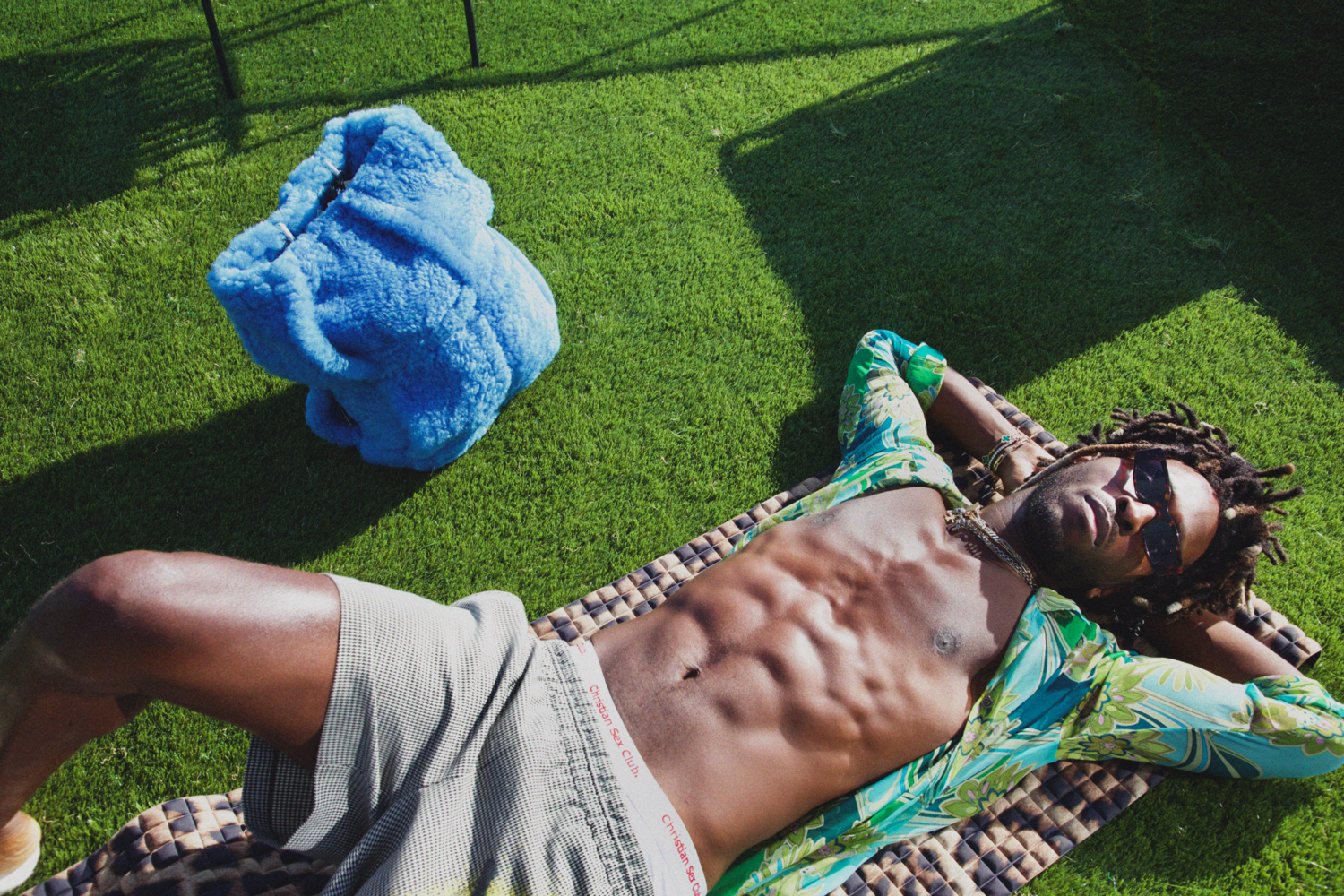
KRAVITZ: What does success with this new album look like? Is it commercial performance, is it critical acclaim, or your own personal feeling?
SAINt JHN: Well, I released two collections before this. Ghetto Lenny’s Love Songs, which you’re on, and Collection One. The people who listened to Collection One were not critics. They were just people who care. The real critics are the people who’ve been there from day one, when nobody else was writing reviews. The 30 people who showed up in Amsterdam, when the venue could hold 6,000 people, those are the real critics. If they feel the same way about this as I feel about this, as I’ve felt about the previous ones, then I think that’s what success is.
KRAVITZ: Right.
SAINt JHN: If new people join the conversation, even better, as long as we speak the same language. But I don’t look at the plaques or at the awards, and I don’t pay attention to the applause. I just want to know I made something that I care about. When I’m driving past Chick-fil-A and I hear it bumping out of a car next to me, that’s the coolest thing in the world, because the people listening to music, they don’t care about my intention. They just want it to fit into the life that they have.
KRAVITZ: I find that when I make so-called mistakes, those are some of the best moments that I’ve recorded. It’s something that you had not intended, but it’s magic. Are you the same in the studio?
SAINt JHN: I’m identical.
KRAVITZ: You’re allowing the creative spirit to do what it wants to do.
SAINt JHN: I like the words mistakes and failures, because they help you contextualize what and why, and I lean into them. My failures have made me successful. My mistakes have made me original. You heard the project. I leave all the mistakes in there. I don’t want it to be perfect. It wasn’t alive if it was perfect.
KRAVITZ: There’s perfection in imperfection. Let it be. What’s the future hold for Saint Jhn?
SAINt JHN: My dreams are happening in real time, and they’re happening faster than they’ve ever happened before, and I recognize that. I used to build my plans in five-year models, but you need a real time frame. You need a real runway if you want to take flight. I’ve started to realize I might be in flight. So my runways are going to be 24 months now as opposed to five years: home furnishing, clothes, toys, skin care. Everything I do is for the pursuit of freedom. I wear the clothes that I wear because no one can tell me I should dress differently. I buy women’s blouses because I like the way they fit on me, because you can’t tell me my shirt has a gender. The future looks limitless.
